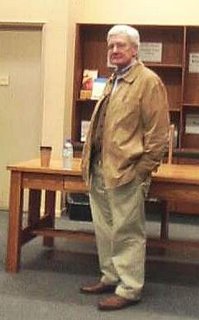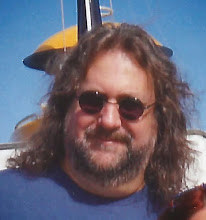 A few days after the Oscars were given out last year I spent an evening after work at my favorite bookstore in Pasadena, Vroman's. It's just two blocks from work and in the past I have seen Howard Stern, T. Jefferson Parker, Walter Mosely and Drew Struzan there, all for book signings. This evening I was there for another book signing. The author was in town for the Oscars and spent a few days doing TV and radio interviews and this one book signing. The author was Roger Ebert and he was there to talk about his new book, The Great Movies II. Even though I have not read The Great Movies I, I knew I couldn't pass up an opportunity to meet the guy who has entertained me on TV for thirty years, the only man to win a Pulitzer Prize for criticism.
A few days after the Oscars were given out last year I spent an evening after work at my favorite bookstore in Pasadena, Vroman's. It's just two blocks from work and in the past I have seen Howard Stern, T. Jefferson Parker, Walter Mosely and Drew Struzan there, all for book signings. This evening I was there for another book signing. The author was in town for the Oscars and spent a few days doing TV and radio interviews and this one book signing. The author was Roger Ebert and he was there to talk about his new book, The Great Movies II. Even though I have not read The Great Movies I, I knew I couldn't pass up an opportunity to meet the guy who has entertained me on TV for thirty years, the only man to win a Pulitzer Prize for criticism.Yeah, Roger did spend a little bit of time talking about his book, which is a collection of 100 essays he has written for the Chicago Sun Times over the past few years. Each essay covers a different film, each is around five pages long, and each is about a film that Ebert loves. Some are well-known and familiar to us all: Alien, Goodfellas, The Right Stuff, The Raiders of the Lost Ark, West Side Story. Others are films I have never heard of: Children of Paradise, Grave of the Fireflies, House of Games. What they all have in common is that Roger loves them all, and through these essays he shares that love with us.
I got to Vroman's early, about an hour and a half early. Even then, after purchasing a copy of the new book, I was about the 20th person to take a seat; a nice, close third-row seat. A man from Azusa (A to Z in the USA!) named Ivan sat next to me. Ivan said he hadn't been to a movie in over five years, that he didn't enjoy most films lately, but that he had watched Siskel and Ebert and then Ebert and Roeper every week and wouldn't think of missing a chance to meet Roger in person, though he was not going to buy a book.
With an hour to go the 100 or so seats were all filled, but people kept coming. They sat on the floor and lined the aisles. Through it all the large stack of books written by Roger, which dominated the front of the room, kept dwindling. With 10 minutes to go they announced that the 12 or so remaining books at the front of the room were the only unpurchased books written by Roger Ebert left in the store. They were immediately absorbed by the large crowd, now numbering, I would guess, around 300. Roger arrived shortly after 7:00 to a standing-room-only crowd of fans and a standing ovation.
Ebert spent a few minutes talking about his book and then started talking about the Oscars and his experience of the Oscars. He and his wife flew into town a few days before the award show and were out every night at this awards show or that pre-Oscar party. Roger noted that at every event he went to he ran into Wolfgang Puck. "Apparently, Puck caters every event in Hollywood." Puck always wore his kitchen "whites" and he never saw him when he didn't have a stain running down the left side of his chest. Roger speculated that he puts the stain on to prove that he actually has something to do with the cooking process. Finally it's the night of the Awards and Roger is working the red carpet in front of the Kodak Theater, interviewing celebrities for a cable channel when down the carpet walks Wolfgang with a tray of food, showing all the specialties he had created for the after-awards party. He had the same stain on his left breast.
He said that people always ask him how he liked the Oscar show and he never quite knows how to answer that other than, "I really didn't see it." Roger explained that although he goes to the Academy Awards every year, he has never been inside of the auditorium. As a writer, he is in a room off behind the stage area with all the other writers. They sit at tables with their laptops while the broadcast is displayed on a TV forty or so feet away and they listen to it though headphones. One side of the room is devoted to the "back stage media area," the place you always see on TV where the winners are being interviewed. "You have to flip up one side of the headphone so you can listen to the broadcast and the backstage interviews at the same time," Roger explained.
"People asked me, 'What did you think of them bringing all the nominees up on stage?' and I said, 'They brought all of the nominees up on stage?'" Roger said it's hard to write a column, watch a TV show and listen to interviews simultaneously without missing something. "While we sit there writing, there are two dozen chairs set up in front of the interview area where sit these people, who have absolutely no credentials but somehow managed to get these passes, which allow them to interview stars. These are not very bright people." Roger recounted two examples from this year:
One interviewer asked Cate Blanchett if she thought winning the Oscar for best supporting actress would help her career. She looked the fellow right in the eyes and said, "Yes, yes it will...asshole." Another interviewer asked Morgan Freeman what he thought it meant that a black man had won the award for best supporting actor. Freeman replied, "It means that more people voted for me than voted for the other guys."
Roger spent time talking about the future of Hollywood, from both the technical and the creative side. He said it's not quite there yet, he can still see a difference, but that it is getting harder and harder to tell digital movies from movies shot on film. "Sooner or later, film will disappear and all movies will be digital."
 Creatively he said the lesson of this year's Oscars is that the studios did not want to make a single one of the top nominated films. He recalled how Universal turned down Million Dollar Baby which was budgeted at $25 million. "Eastwood has stayed with Universal ever since Dirty Harry and has made the studio a couple of billion dollars over the years, but they wouldn't give him $25 million for something he believed in because their research said nobody likes 'boxing' pictures."
Creatively he said the lesson of this year's Oscars is that the studios did not want to make a single one of the top nominated films. He recalled how Universal turned down Million Dollar Baby which was budgeted at $25 million. "Eastwood has stayed with Universal ever since Dirty Harry and has made the studio a couple of billion dollars over the years, but they wouldn't give him $25 million for something he believed in because their research said nobody likes 'boxing' pictures.""Clint had to find a private investor to put up half the money and then basically shame Universal into putting up the other $12.5 million. The investor got all foreign rights to the film, meaning Universal made a very, very costly mistake." Speaking more on Eastwood, Roger commented that, "Had Clint Eastwood not had this huge career as an actor, he would be known as one of the greatest directors of all time. Just look at the last two years. Of the eight Oscars given for acting, Clint Eastwood directed four of the performances. No one has ever done that before."
All too soon it was a hour later and the Vroman's people were giving Roger the "hairy eyeball." "This is a retail establishment," said Roger taking note of the looks being directed his way, "so I guess we ought to get to signing some books." Which he did. I was the fifth person in line and wouldn't have missed it for the world.



No comments:
Post a Comment